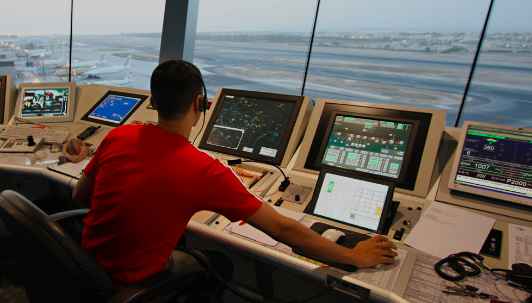
Air traffic controllers hold a critical position in the complex web of activities that constitute the aviation sector. In Nigeria, a country experiencing significant growth in its aviation industry, the role of air traffic controllers becomes even more pivotal. This essay embarks on a comprehensive exploration of air traffic controller jobs in Nigeria, delving into the intricacies of their responsibilities, the challenges they face, the education and training required, and the evolving landscape of this essential profession.
The Significance of Air Traffic Controllers
A. Safeguarding Airspace Integrity
- Collision Prevention: The paramount responsibility of air traffic controllers is to prevent collisions between aircraft by maintaining safe separation distances.
- Communication Hub: Serving as a communication hub, controllers provide instructions to pilots regarding takeoff, landing, altitude changes, and route adjustments.
B. Managing Air Traffic Flow
- Airspace Coordination: Controllers are responsible for managing designated airspace efficiently, ensuring the smooth flow of air traffic while adhering to established regulations.
- Collaboration with Pilots: Seamless collaboration with pilots is crucial for the efficient movement of aircraft during departures, arrivals, and en-route operations.
Education and Training Requirements
A. Academic Background
- Bachelor’s Degree: Aspiring air traffic controllers typically pursue a bachelor’s degree in aviation, air traffic management, or a related field.
- Specialized Training: Following academic qualifications, candidates undergo specialized training encompassing air traffic control procedures, communication protocols, and the operation of radar equipment.
B. Licensing and Certification
- Nigerian Civil Aviation Authority (NCAA): Air traffic controllers in Nigeria must obtain certification from the NCAA, the regulatory body overseeing aviation in the country.
- Continuous Professional Development: Controllers engage in ongoing training to stay abreast of the latest technologies and regulations, ensuring their skills remain current and relevant.
Responsibilities and Challenges
A. Dynamic Decision-Making
- Real-Time Decision-Making: Air traffic controllers make split-second decisions to manage traffic flow, respond to emergencies, and ensure the safe execution of landings and takeoffs.
- Emergency Handling: Controllers are trained to handle emergencies, such as engine failures or adverse weather conditions, with precision and efficiency.
B. Work Environment
- High-Stress Environment: The nature of the job can be inherently stressful due to the need for constant vigilance and the potential consequences of errors.
- Shift Work: Air traffic controllers often work in shifts, including nights, weekends, and holidays, to ensure 24/7 coverage of airspace.
Technological Advancements in Air Traffic Control
A. Radar and Communication Systems
- Advancements in Radar Technology: Innovations in radar technology have enhanced the precision of tracking aircraft movements.
- Digital Communication Systems: The shift to digital communication systems has improved the clarity and efficiency of communication between controllers and pilots.
B. Automation and Artificial Intelligence
- Automation in Air Traffic Management: Automation tools assist controllers in managing airspace more efficiently and accurately.
- Integration of Artificial Intelligence (AI): The integration of AI into air traffic management systems aims to analyze data and optimize traffic flow.
Air Traffic Controller Jobs in Nigeria: Current Landscape
A. Airports and Control Centers
- Major Airports: Air traffic controllers are stationed at major airports such as Murtala Muhammed International Airport in Lagos and Nnamdi Azikiwe International Airport in Abuja.
- Regional Control Centers: Regional air traffic control centers, including the Lagos Area Control Center, oversee en-route air traffic, ensuring safe transitions between airports.
B. Demand for Air Traffic Controllers
- Growing Aviation Sector: Nigeria’s aviation sector is experiencing growth, leading to an increased demand for skilled air traffic controllers.
- International Standards Compliance: Adherence to international safety and navigation standards necessitates a sufficient number of qualified controllers.
Opportunities for Career Advancement
A. Specialized Roles
- Tower Control: Controllers may specialize in tower control, managing aircraft movements on runways and taxiways during takeoff and landing.
- En-Route Control: En-route controllers manage aircraft in the airspace between airports, ensuring safe and efficient transitions.
B. Supervisory and Management Roles
- Supervisory Positions: Experienced controllers can progress into supervisory roles, overseeing teams of controllers and ensuring operational efficiency.
- Management Positions: Advancement to management positions within aviation authorities or regulatory bodies is a possibility for seasoned professionals.
Collaboration and Communication
A. International Collaboration
- ICAO Standards Adherence: Nigeria collaborates with the International Civil Aviation Organization (ICAO) to ensure that air traffic control practices align with global standards.
- Training Programs: Collaborative training programs with international aviation bodies contribute to the continuous professional development of Nigerian air traffic controllers.
B. Communication with Pilots
- Effective Communication: Clear and concise communication between controllers and pilots is crucial for safe and efficient air traffic management.
- Multilingual Skills: Proficiency in English is essential, and controllers often need to communicate with pilots in multiple languages, enhancing global communication standards.
Government Regulations and Oversight
A. Nigerian Civil Aviation Authority (NCAA)
- Regulatory Framework: The NCAA establishes and enforces regulations governing air traffic control and aviation safety in Nigeria.
- Oversight and Audits: Regular audits and oversight activities ensure that air traffic control operations comply with established standards and protocols.
The Future of Air Traffic Control in Nigeria
A. Technological Integration
- NextGen Air Traffic Control: Nigeria may adopt NextGen technologies to modernize air traffic control systems, enhancing efficiency and safety.
- Drone Traffic Management: With the rise of drones, the integration of systems to manage drone traffic alongside manned aircraft is a potential area of development.
B. Human Factors and Training
- Consideration of Human Factors: Continued research on human factors will contribute to the development of training programs that enhance decision-making and reduce errors.
- Simulation Training: Advanced simulation training facilities provide realistic scenarios for controllers to hone their skills, ensuring they are well-prepared for various situations.
Conclusion
Air traffic controller jobs in Nigeria epitomize the intersection of responsibility, skill, and technological advancement. As the aviation sector in Nigeria continues to expand, the demand for proficient air traffic controllers is expected to rise. These professionals play a vital role in ensuring the safety and efficiency of air travel, contributing to the overall growth and development of the country.
The challenges inherent in the high-stress environment and dynamic decision-making are balanced by the opportunities for career advancement, specialization, and leadership roles within the aviation sector. As technological advancements reshape the landscape of air traffic control, Nigerian controllers are at the forefront of adopting new systems and ensuring seamless integration.
In navigating the skies of Nigeria, air traffic controllers are not merely guardians of airspace; they are architects of safe and efficient air travel. As the nation looks to the future, the dedication, expertise, and adaptability of its air traffic controllers will continue to be pivotal in shaping a robust and thriving aviation industry.







